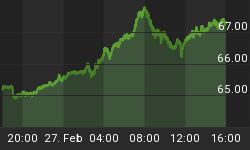With gold prices rising against all of the world's fiat currencies, some have suggested that gold now trades as if it were an alternative currency, on par with the dollar, euro, and yen. However, this observation reveals a basic lack of understanding of the difference between money and currency. Since the confusion seems to be wide-spread, I thought it would be worthwhile to try and clarify the issue.
In addition to being a unit of account, medium of exchange, store of value, and a method of deferred payment, money must possess intrinsic value. Historically, many commodities have functioned as money, but none as successfully as gold, with its most common form being the coin. However, blacksmiths, banks, and governments routinely issued notes redeemable in money, which in most cases was gold. Such notes, referred to as note-currency, or simply currency, would circulate alongside actual money. Total money supply then would consist of actual money, gold or silver coins, and note-currency. However, even though currency circulated alongside of money, the notes themselves were not money, but in effect money substitutes. The money itself was the gold that the note currency promised to pay.
With the advent of fraction reserve banking, the supply of currency would expand and contract, as notes were continuously issued into and withdrawn from circulation. The supply of real money however generally increased slowly, though its rate varied slightly as a result of discoveries or the volume of coinage. Legal tender refers to a status conferred on money by government. However, in modern times, what circulates as legal tender is not money at all. In fact, it is not even currency, as by definition currency most be redeemable in money. What circulates today is simply fiat currency, or currency backed by nothing.
However, this is not they way it is supposed to be. For example, the United States is constitutionally on a bi-metallic standard, as the Constitution, in article I, section 10 prohibits states from making anything other than gold and silver coin legal tender in payment of debts. The Federal government, in article 1, section 8, is only authorized to coin money and regulate the value thereof. As the only coins the states can make legal tender are gold and silver, the Federal government's monetary powers simply consist of coining gold and silver in fixed standards of weights and measures. As the states are specifically barred from issuing currency, referred to in the Constitution as bills of credit, and the Federal government is neither authorized to establish legal tender nor emit bills of credit, gold and silver coins are still the only constitutionally authorized money in the United States today.
Some have argued that since the constitutional prohibition against making anything other than gold and silver coins legal tender is limited to the states, it does not apply to the Federal government. However, such an assertion is blatantly ridiculous, as the 10th amendment to the Bill of Rights clearly states that "those powers not delegated to the United States by the Constitution, nor prohibited by it to the states, are reserved to the states respectively, or to the people." Therefore, as the Federal government is not authorized to print fiat currency, it has no legal authority to do so. In fact, the original draft of the Constitution did include a Federal authorization to issue bills of credit, but the framers had the good sense to strike it out by a vote of nine to two, with two abstentions. The fact that the irredeemable notes of a private banking syndicate, de facto quasi-governmental agency now circulate as legal tender in the United States reflects a colossal failure on the part of the American Judiciary to enforce the constitutional restraints imposed on Congress.
In conclusion, there is money, which includes gold and silver, and money substitutes, which include legitimate currency, which is redeemable in actual money, and fiat currency, which is redeemable in nothing. Rather than trading as another currency, gold is finally reasserting its temporarily lost monetary status. Its rise against all of the world's fiats currencies does not represent a preference for one currency over another, but a preference for actually money over mere substitutes.
Do not settle for money substitutes. Demand the real thing. Protect your wealth before it's too late. Discover the best way to buy gold at www.goldyoucanfold.com, download my free research report on preserving your purchasing power through foreign equities available at www.researchreportone.com and subscribe to my free, on-line investment newsletter at http://www.europac.net/newsletter/newsletter.asp.















